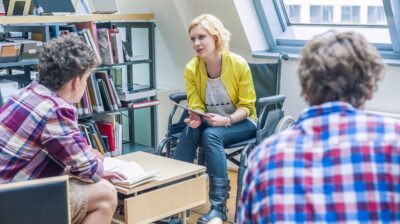How my arthritis has changed my life
Emily talks about how Invisible Disabilities Ireland helps young people across Ireland

I was diagnosed with rheumatoid arthritis at the age of thirteen when my immune system reacted abnormally to a virus and started mistakenly attacking itself. Rheumatoid arthritis is an autoimmune disease where my immune system attacks my joints and the surrounding areas meaning I get a lot of pain, fatigue and swelling throughout my body. This diagnosis turned my whole world upside down. I went from a bubbly, active and busy person to not being able to get out of bed without screaming in agony. It was a tough time in my life coming to grips with the fact that I had a stigmatised “old person’s disease” for life when I wanted nothing more than to be normal and fit in with my peers.
The last few years since diagnosis have been a rollercoaster of setbacks, achievements and loss. I have gotten multiple complications and have been diagnosed with fibromyalgia and Irritable Bowel Syndrome (IBS) to name a few. I have relapsed, had flare-ups of my condition and have had medications stop working. Having a compromised immune system means I get a lot of infections. This means a lot of hospital appointments, blood tests, trips to the GP and A&E. As well as that I have had four surgeries in the space of a little over a year in my second home Tallaght Hospital. But if you were to look at me you’d never think all of this is happening to me.
Dealing with a disability that no one can see
Arthritis affects more than my health and has spilled into all areas of my life including education, work and my social life. The stark reality of a chronic illness really opened my eyes to the inequalities I faced compared to my peers as the statistics are stacked against people with disabilities. I found both school and college particularly challenging as I don’t have the same playing field as my peers as I am constantly in and out of hospital, going home sick or not being able to concentrate in class due to fatigue and pain. Access to disability resources can also be a challenge when you have an invisible disability. I find it difficult to avail of resources such as a disabled toilet or car parking space as the looks I receive are unbearable at times. Even though my disability is valid, it’s invisible to others.
However, like many illnesses, arthritis in younger people is generally an invisible condition, as what’s happening is completely internal. Over the years, I have always found it difficult to explain how severe my pain and fatigue was when people asked, or how much it affects my mental health and quality of life. Daily tasks like hoovering, waiting for the bus or doing college work can cripple my fatigue levels and make day to day life difficult to plan as my condition fluctuates. This means there are days when I feel like I can move mountains, and days where I’m not able to get out of bed. So I take the good and bad days as they come.
Invisible Disability Ireland
I founded Invisible Disability Ireland back in 2019 as a way to increase awareness and understanding for invisible disabilities. We need to challenge the perception of disability as the majority of disabilities have hidden impairments. On the page, I share people’s stories and raise awareness about multiple conditions. Most importantly the page supports others going through the same thing. It helps in knowing they are not alone and that thousands of people across Ireland are living with invisible conditions too. Although the universal symbol of disability is a wheelchair, disabilities comes in all different shapes and sizes.
My advice for young people with invisible illnesses
It has taken many years for me to begin talking about my condition comfortably and opening up about it. Illnesses can often be a grieving process as you begin to come to terms with everything that has happened. Although there are days where you feel like giving up or have lost faith, it’s important to reach out, be it to your medical team, friends or family. Having the support of someone is a massive part of how I cope with what’s going. No one should go through illness alone. My advice is to take a step back, put everything in perspective and try to focus on the positives in your life. Illness is a lifelong journey that you must continually adapt to and make the best out of what’s been given to you.






